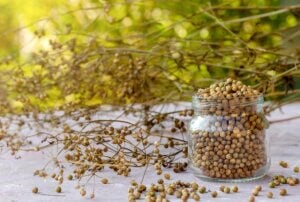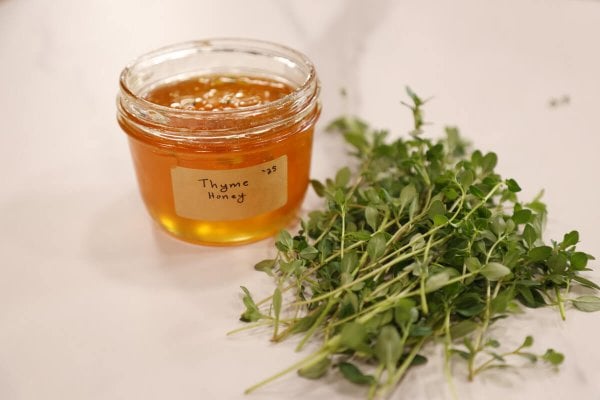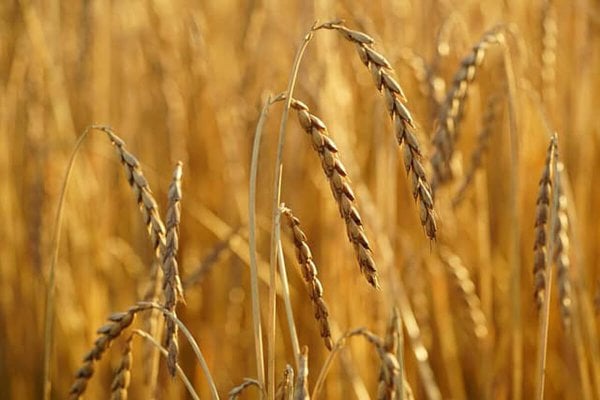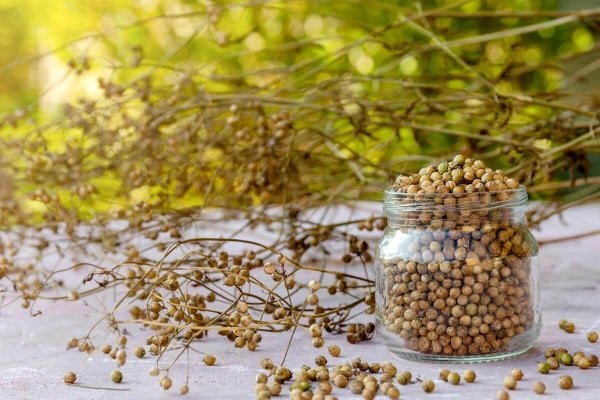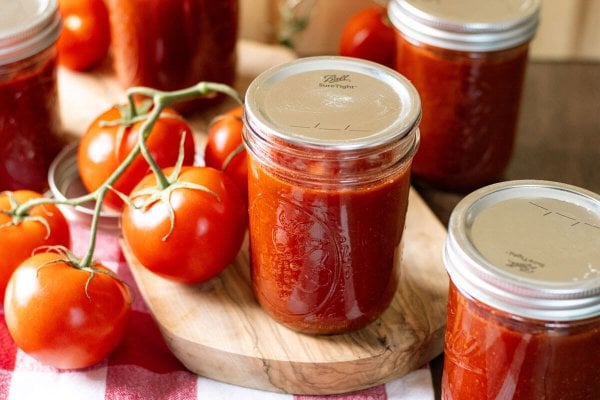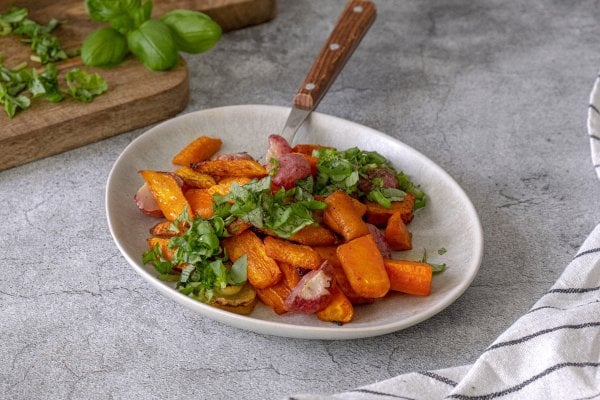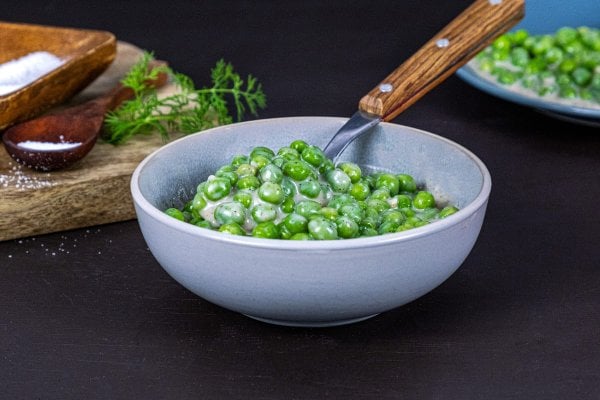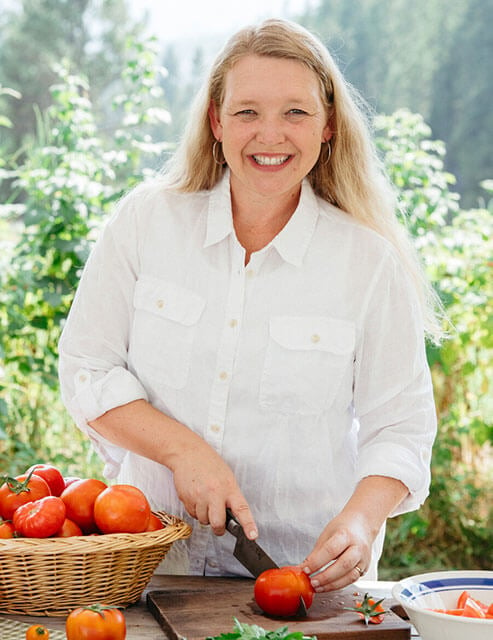Listen and Subscribe: Apple Podcasts | Spotify | iHeart | Google Podcasts
Want to know what happens when you combine people, gardens, animals, and weather? A guarantee that things can and will go wrong when you least expect it!
During this episode of Pantry Chat Josh and Carolyn talk about a recent incident on their homestead and how it helped them identify problem areas in the preparedness plan and ways you can learn how to be better equipped when those unexpected moments on the homestead throw you a curveball.
In this Episode:
- A major windstorm and two unexpected freezes caused some major problems for Josh and Carolyn this past week and the impacts it had on the harvesting and produce.
- How unexpected events can help identify gaps in your preparedness plan.
- How to pause, take stock of the situation, look for the positive, and learn to identify problems quickly to find the right solutions.
- Josh talks about how to create better efficiencies, especially when it comes to fuel reserves and mobile lighting.
- What was the one success story that came out of this incident?
- How to involve your kids to work together as a family to overcome hardship when you’re faced with unexpected circumstances.
- Question of the week: Regarding tomato fermentation and vegetable preservation. Do you have to burp your jars?
Resources:
- MadeOn skincare products MadeOn skincare products
- Follow Homesteading Family on Instagram
- Follow Homesteading Family on Facebook
More Resources for the New Homesteader
-
- How to Get Started Homesteading
- How Preparedness Helps Protect Our Families with John Lovell
- Good Enough is Perfect
- Apartment to 40 Acres – Our Homesteading Journey
- 8 Things You Need to Know When Buying Homestead Property
- Building Resilience with Justin Rhodes
- Starting a Homestead Business (Tips from Joel Salatin)
Josh: Hey you guys, this is Josh.
Carolyn: And Carolyn.
Josh: With Homesteading Family, and welcome to this week's episode of the Pantry Chat Food for Thought.
Carolyn: Today, we are going to be talking about what to do when things go wrong on the homestead.
This episode of the Pantry Chat podcast is sponsored by MadeOn Skincare. MadeOn specializes in skincare, specifically for dry skin, and they use as few ingredients as possible to get the job done. You guys, this is the type of skincare I would make myself if I had time to make it in my own home. The great thing is, Renee even shares her exact recipes with you. The bee silk lotion bar is my go to lotion when my hands get dry and cracked, and it's only made with three ingredients. Renee created it when she needed something to fix the splits in her fingers, cracks in her feet, and then she found out that it also worked great on her son's seasonal eczema. Go to hardlotion.com/homesteadingfamily to find out what Josh's favorite MadeOn products are, and also use the code Homesteading Family for 15% off today's purchase.
Josh: Wow. Well, it has been an interesting week.
Carolyn: Yeah, we're kind of, we're still rolling with the punches this week.
Josh: That's right, but there were definitely have had some things going sideways on the homestead and we thought we'd take a little detour today and just talk about boots on the ground reality, and what do you do when everything just goes sideways, when things go wrong?
Carolyn: This is kind of an unscripted off-the-cuff episode today, but we're excited to be here with you guys, because I think this is a really important topic. Because you get people and gardens and animals together ...
Josh: Along with weather.
Carolyn: ... Along with weather, you are bound to have things go wrong. It is like written into the law, so we're going to be talking about how to handle it.
Josh: That's correct, and usually we do a little chit chat, but I think today's chit chat really is just what we're talking about because it's affecting us right now. You want to just dive into a subscriber question real quick?
Carolyn: Okay, let's do that.
Josh: Then we're going to let you know what's going on in the whole episode.
Carolyn: Absolutely.
Josh: Okay, so this one is for you today. This is from Amore Noor, on Easiest Tomato Preservation video. This is a fermentation video. She says, "Yummy, but I've got a question. Do you have to burp them? They won't break if you don't?"
Carolyn: Okay. Great question. A lot of fermenting, you do have to burp if you don't have an airlock. Of course, you can use an airlock whenever want for vegetable preservation so that you don't have to burp your jars. I have found that the tomatoes don't tend to produce as much gas, so I usually cap them down and don't burp them unless I start to feel like they're bulging, like they seriously need a burping. In which case you want to do that as quickly as you can, just enough, just unscrew your lid just enough to let out that air, that hiss sound, and then screw it right back down.
Because of the sugars, the more sugars in the tomatoes, they do have more of a tendency to have some fermenting problems ...
Josh: Keep an eye on them.
Carolyn: ... Keep an eye on them, burp them if you feel like they need it and yeah, enjoy that. If you guys aren't doing that, if you have not tried fermenting your tomatoes, you should absolutely do it, especially if you're getting to the end of the year and you're like, "What do I do with these things? I've got more coming in than I can handle." Try putting up a few large jars. You want big jars, half gallon plus, gallon-sized jars of tomatoes fermented, you are going to be amazed at how they turn out.
Josh: Fermented tomatoes and fermented carrots are two of my favorite that you do. Carolyn's got videos on both of those.
Carolyn: Yes, absolutely.
Josh: We'll leave some links in the description if you want to learn how to do that, but hey, getting into it today.
Carolyn: Yeah. What's going on in the homestead?
Josh: Right. It has been a little bit wild. We had a major windstorm few days ago and thankfully the wind didn't do a lot of damage to us personally, though our road out had trees all over it. With that, we lost power. With that, we then had an unexpected, hard freeze.
Carolyn: The weather report said that we might get 38 degrees, so we were ready for a frost.
Josh: We were looking for a frost. We were dealing with power systems and getting our generators in place. Thankfully, we're well-prepped for that and got plenty of power to cover the bases and plenty of fuel, but we were not prepped, and there was only so much we really could have for a hard freeze here in early September.
Carolyn: Yeah, so we woke up to 26 degrees out in the garden.
Josh: Yep. Tomatoes don't like that.
Carolyn: No, there's a lot of things that don't like that.
Josh: Cucumbers don't like that.
Carolyn: Green beans don't like it either. We actually limped through that one because we got out there, we watered the garden right away. There were a few things that were going to survive and make it a little bit further to mature more. This being 2020, I was looking to get every ounce of harvest out of that garden and get it on the pantry shelves. Filling your pantry sounds really good this year. I was really thinking, "Okay, we're going to get a little bit more after we watered it," and then we had a second night of freeze, hard, hard freeze. The garden, the tinder vegetables in the garden are now gone.
Josh: Yeah, and if you haven't heard about the watering, this can work. It definitely works for frost. When you have a frost or a freeze, if you get out there and you water, sprinkler systems, hand watering with a hose nozzle, before the sun hits them for frost, it will save usually everything. For freezes, it can save a lot. Now, I got to say we had frozen hoses solid, which we didn't expect. We were fumbling. We were out of power in the pump house, had to get the generator up there. It was just a real fire drill trying to get set up to get water on things. We didn't make some of it before the sun. Some of it honestly just froze so hard ...
Carolyn: It was such a hard freeze.
Josh: ... That it just didn't do it. Then a second hard freeze, second night in a row really did it. This is when you're ... Really any life, but particularly when you're living the homesteading life and you're trying to do so many things, whether you're working full time and then you're trying to grow your own food, you're managing the property, you can be guaranteed that things are going to go wrong and they're going to go wrong usually, or often at the worst possible moment.
Carolyn: A lot of times in groups. There's the old kind of superstitious saying that bad things happen in groups of three. I wouldn't say that I necessarily believe in that to that level, but there is a principle there that one thing can trigger another thing. Handling the garden freezing would be a busy day. We handle that every year though. The garden freezing. Quick, get everything in, bring it in, get it preserved. Handling that sort of day with a power outage is a whole different animal.
Josh: Not expecting it. I mean, we know there's a time where things are going to freeze and usually it's there on the weather report and you just can't always trust the weather men. I think that they practice.
Carolyn: They practice.
Josh: Right.
Carolyn: They don't have it down to a science yet.
Josh: Right, so there's one takeaway right from the get go. That is planning for the unknown, being prepared for the unknown. There's a lot of things that we prepare for and we plan for, and whether they're in the near future or some of the bigger issues that we're concerned about that affect our whole lifestyle and why we're living this way that we're planning for, but there's going to be the unknown that's going to happen that's just going to really catch you off-guard on top of everything else. Just being aware of that and planning for that and thinking ahead and all the different preps, and all the different situations that we can plan for.
Carolyn: Yeah. Well, and if you're watching right now and you are watching actually the video version of this and you're going, "What is up with the lighting? Why are they squinting? Why are we like, 'I can see the camera?'" It's because the power is still out. We're on day three of a power outage. They're just saying extended power outage. They don't even know. They're not giving us any updates as to when the power might come back on, and so we have kind of a funny light set up down here right now.
Josh: We're running off a generator and some chords to this section of the house because it's not powered by the main breaker for the generator. Yeah, we've got makeshift lighting,
Carolyn: I think moments like this help you really see like where are you prepared? Where are you not prepared? Real quick, Josh, what do you think? What do you think we've done well in this scenario, like we were prepared for it, we're feeling good about the places we were prepared for this.
Josh: Well, I think one of the first thing is attitude and approach.
Carolyn: Yeah, that's a good one.
Josh: That there's already a lot of stressors going on in the background for us. That's why I mentioned that these things often happen on top of other things that are already challenging. Your attitude really makes or breaks a situation. Our ability to go into it and be prepared to roll with it, identify the problems and the challenges, and then find solutions and not dwell on that. I think that is the main area that we're well-equipped in before we get into the actual-
Carolyn: Yeah. That's a good thought. I hadn't thought of that. You mean I didn't just melt down and like go hide back in bed?
Josh: No, you've been smiling as usual. She's amazing.
Carolyn: I had a moment where I thought I might laugh hysterically because that is often my response and stress is like, you've got to be kidding. This is a joke, right?
Josh: Yeah, and then reality sets in and we roll on.
Carolyn: We roll on, yeah. That's good. Well, you do too. You're good at keeping things pretty lighthearted and just finding the answers and moving forward. I think that's really important, that mindset is such a big thing. The first step of that mindset thing is not to panic and it's easy to do when you're like, "Oh my gosh, and this is happening, and this is happening, and this is happening." It's really easy, at least for me, to start feeling really overwhelmed really quickly and start just like scrambling in every direction. That's not effective.
Josh: Well, and when you get into the, you can learn this if you've ever studied in survival training, panic and fear is the thing that gets you off track. Even in a situation like this, just stress, just taking on too much stress, you're not going to think clearly. You're going to get over worried about the problems and have a hard time identifying appropriate solutions. Really just keeping a cool head as they say, and identifying the problems. This is a permaculture principle that is really, we're solutions-oriented. Okay. We've got some problems here. What are they? Let's move past dwelling on them, freaking out about them, being worried, and let's find the solutions. For us, the first one was okay, we had wind, we didn't have any wind damage power. Yeah, and we've got generators. We don't have a central backup system. We just had to mobilize the generators, get them in their places, run cords in some instances, and we have fuel. That's something that we've done well in this situation, as we were able to keep the core systems up and running,
Carolyn: Even the laundry, which around here is really [crosstalk 00:11:40]-
Josh: Laundry and dishes don't stop ever in this house.
Carolyn: No, so we've actually been able to keep the washing machine going, which is really nice because yes, I can wash clothes by hand, we have a lot of clothes in this house. I'm really thankful to not have to do it, but we are also thankful for our clothes rack and being able to put things out in the sun.
Josh: What about you? What are one of the things that you've seen gone well here?
Carolyn: That we've done well. I think there's that old adage people used to talk about. Let's just sit down and have a cup of tea. Like before you do anything, sit down and have a cup of tea. For us, it's our espresso. I'm going to joke a little bit and say, just one of my takeaways is make sure that the espresso machine plugs into the generator. Okay. That is essential. Yes, it's a joke, but on the other hand, when you have times where things get a little dicey, a little shaky, dodgy.
Josh: Yep, a little dodgy. Mm-hmm (affirmative).
Carolyn: Having some of your ritual things that keep you grounded is really important, I think, and really, really helpful. I think that's something we did really well. We had the espresso machine hooked right up. That was like the first thing that was powered. It was really good. I really appreciate that.
Josh: Yeah. Sometimes you have to balance that. We had to jump in the morning, up in the morning and realized we had a hard freeze, go right out, check on the garden, do our best to get water on it. See if there's anything that needed to come inside. Got through that kind of emergency response. Came in and did what you're talking about, sat down, think, "Okay, what do we have going on?"
Carolyn: Processed a little.
Josh: "What do we do next? What does our day look like? How do we shift?" We've got, I think, 13 people in the house right now and from a 91-year old to a two-year old and everybody in between. That affects everybody's day and we've got to kind of rewire for the day or in this case days, and then come up with that plan. It's really important to take the time to do that. Not just go and do, do, do.
Carolyn: Right. Absolutely, so I would say just having the ability to do just that was one of the things that we actually did really well. Another thing though, that I feel ... Preservation days like that are really big days and they're hard days sometimes. They're really long because you just get just this huge wave of stuff that it's like now or never. Some of it may already be frost damaged. You have to kind of sort through it, see what you're going to do.
I think one of the things that we did really well, and we've been developing this for years, we have a lot of preservation methods at our fingertips that we have developed. From handling green tomatoes, to fermenting, to all these different things that actually can handle large amounts of produce really, really quickly. Much faster than just, let's say, we have to just can everything right now, which is actually time-intensive. Sometimes you just don't have that time. I feel like we're responding really well in that way, that every year we learn a little bit more about new preservation techniques that we can use. We'll get into that in a minute. I'll tell you guys what we actually did with some of the different produce that's coming on, but I feel like that's a good thing. What about things that you feel this exposed that we were not as prepared as we would like to be?
Josh: Oh.
Carolyn: I can think of one right off.
Josh: Okay. Why don't you shoot?
Carolyn: Lighting. We were not prepared with lighting. I don't know.
Josh: Well, mobile lighting, we've got a ton of oil lamps, but we've realized those really aren't the best go-to in today's modern world because there's LED, low voltage lights and we have some, but we were not as organized on that. We don't have the house covered as well as we should. Well, we had adequate, we definitely had enough between headlamps and a few of them, but for the size of the house and the amount of people that we need to make sure that grandma's got lighting, and all of these different areas, I think you're very right.
Carolyn: Yeah, well there's there's elements, especially when you have kids in the house, you're just not going to leave an oil lamp burning in the kid's bathroom all night long. Just not going to happen. They're going to have dark, but when you've got grandma who uses that bathroom and needs to be able to see in the middle of the night, you need some option for in there. We were light on that. Also, bright enough lighting to work under. I know historically, that's a real challenge. There's only so much light you ever get off of an oil lamp, even if you're using really good, like the Aladdin lamps that just are the mantle lamps. They really put a lot of light out, but that's like one 60-watt light bulb. That's not what we're used to working in modern kitchens and dark. I think that would be an area we really need to upgrade and get more of those LEDs, some more of those.
Josh: Yeah, just more spread out. We haven't had this duration of a power outage in a long time and we've dealt with a day before and one evening usually is the worst it is, power comes back on in the middle of the night or in the morning. What we've had has felt adequate for that, but you realize going through this and really wanting to be prepared that yeah, we need to up that system, we need to improve that system. There's no reason not to have a lot of rechargeable batteries, a recharging station, wherever your generators plugged in. Eventually, we'd love to have a whole house generator. That's part of the plan. Eventually it just kicks on automatically, but we don't have that. We do have a plugin that runs part of the house. We've got stations that have power. You want to have a place that's going to power batteries and then a lot of portable LED lights and that can really light a house up well. Headlamps and ones that you can move around.
Carolyn: Definitely. Good. Any other thoughts on anything that-
Josh: Well, one of them for us is fuel and we've got plenty of fuel, but they're in a lot of little cans and Trista and I were talking about we really ought to step up to a 50 or a couple 50-gallon drums of fuel ...
Carolyn: Oh, that's a good idea.
Josh: ... Because there's just less moving around and less stuff to deal with. It would just create inefficiency, so it's not a major issue and so we work with what we have and I've known that, we've got a lot of cans. I don't really want to go and buy something else because what we have works. Now, when you're starting to go day, after day, after day of filling things up and moving a lot of cans around, it would be good to just have a little more centralized system for that in place. Also, maybe staging. We're spread out on our property. Staging the generators, like I've had them all in one place, actually staging them, like we're going to leave one up at the pump house and just leave it in the pump house. Create a spot for it and just have that easier to mobilize. The little efficiencies like that can really help just improve the system and get things up and running faster so that we can get onto other things like the garden.
Carolyn: Good. I think that's good. It's really important to do. Okay, so I came up, when I was thinking about this, about a few different steps to take and we've kind of lightly touched on it, when you're facing something unexpected on the homestead/ whether it is an animal emergency, which those definitely happen, whether it's a larger personal crisis or whatever it is, something like a power outage and number one is to not panic. We already talked about that. Try not to panic, take a few deep breaths and step back from the situation for just a second. In almost every situation, you've got time to take a breath and to rethink what's going on.
Josh: Oh, unless it's an immediate emergency, you want to make that time. You may not feel like you have it. I mean, sometimes there's just things that have to be done. You've got a medical emergency, it needs attention right away. You might have a hazard. I mean, we had a lot of power lines down in our area. There's things you have to do right away. As soon as you get over that though, there's usually going to be a lot of other things. Then that's where you're talking about. Take those few moments and gather with your people, your group, your team, your family, pray, and just take a few minutes to get grounded and start to work on that plan.
Carolyn: Right, so I think that's a good moment. Take a few minutes just to breathe, take a few minutes to pray and kind of step back from the panic of the situation. Then after that, really take stock, what do you have? What are your resources? What can you do? What do you have to do? I know for me, sometimes my brain is so geared towards growing a garden, preserving it, that's just an example, but to me, those are the steps that are going to happen. Something throws a curve ball at me and I have a hard time stepping back from the fact that I can let that go and look at it creatively and go, "Okay, is it the end of the world if we don't preserve this particular thing? Maybe for the sake of the whole family, we need to let that thing go." Just taking that moment to step back out of your situation and be able to look at it creatively, but taking stock of what really needs to happen.
Josh: Well, and I think in just picking up on that real quick, what you're describing is prioritizing the steps you're going to take in your solution. It's not just coming up with the solutions, but prioritizing them.
Carolyn: Yeah, so you have your solutions, you have them prioritized. I think that something to remember is that good can come out of the unexpected situation. Sometimes it's not a tangible good. Sometimes it's not, "Oh, I somehow magically ended up with twice the amount of vegetables that I was growing that got ruined in the garden," but when you can work together with your family, those are the memorable moments, especially if you bring the kids in. I know for me, it's really tempting to just say, "Hey kids, go play in the forest for a day." Kind of get them out from under foot because I'm processing, I'm stressed. I'm trying to figure out what to do.
If you bring them into that situation, sit them all down and say, "Okay, we have a problem. We need to all pull together. This is all hands on deck right now," it actually becomes a really good memorable moment for everybody where we're all working together towards a good. I would really encourage you as you're taking stock of your solutions, figuring out what you're going to do. Include the kids in that. Like as much as they're able. Give them a job to go do to help out.
Josh: Well, and a good example right now is the corn. The corn was getting ready for harvest anyways, but we really didn't have the time to do it right now. We really don't with everything that's just happened. However, it's dead now. It needs to get in. You mobilized a bunch of the kids from the middle ages down to the little ones. They went and harvested the corn, got it all in. We even got them shucking it. They're actually having a great time there. They're getting valuable work done and they're out there shucking the corn and playing in all the shuckings, I don't know.
Carolyn: Sounds good, husks.
Josh: They're getting work done and they're having a good time and they're contributing and we're able to say, "Hey, great job, you guys." Really, they had fun and they're providing a solution at the moment and not everything's that easy, but that's a good example of what you're talking about.
Carolyn: Yeah, it really is. This winter, when we're eating that corn, that I'm going to put up in an emergency fashion right now, we're going to be sitting around talking about, "Do you remember the day that we had to harvest all of this corn really fast?" This memory is going to come out and you just build that family culture. Even though it may not be a great moment in what your plans were originally, it can still be a really good thing and a really strengthening thing for the family I think. Just remember, there is good things that can come out of the bad things. Hey, let's take a minute and talk about what we're actually doing with all of this produce that came in. We were really excited about our hoop house tomatoes this year, north Idaho is a hard place to grow tomatoes.
Josh: We were growing one of the better crops that we've had up here in north Idaho and then-
Carolyn: They were looking beautiful. They were just thinking about ripening. We've maybe had about six ripe to it. That's my estimate, about six. What do you think? About six ripe tomatoes out of the garden, and of course, this freeze hit so the tomatoes are done. They were not ripe. Most of the tomatoes themselves were not damaged in the freeze, which is good. That's really important. What we've done for years with our unripe tomatoes is to put them in a box. We have to make sure they're very dry and make sure they're very dark and they will slowly ripen in a cool place. And we will actually be eating those tomatoes ripe in the next month. We were able to do that really-
Josh: Maybe the next few months, we've done that where we've had ripe tomatoes into December, which is pretty cool [crosstalk 00:24:05].
Carolyn: I do have to say, especially if you're starting with really green tomatoes, the is not the same as vine-ripened, fresh summer tomatoes, but you still get tomatoes and you turn those green tomatoes into red tomatoes. We have tomato sauces right through the late part of the fall, which is really good.
Josh: Better than the cardboard-tasting, store-bought tomatoes.
Carolyn: They are still better than the cardboard tomatoes.
Josh: Good, so you've got the tomatoes handled and that won't be a total loss.
Carolyn: Yeah. Well, and the exciting thing was, is that took a total for me in the house of about 20 minutes to handle bushels of tomatoes, because it's literally put tomatoes, put some newspaper, put tomatoes, put newspaper, put them down in the basement, so that's really good. Move on.
Josh: Yeah. What about the cucumbers? Because that's another one that just was done and I didn't see ... Were there a bunch on there because you've been harvesting cucumbers regularly?
Carolyn: Yeah. Luckily, we already had a lot of cucumbers put up as pickles. These at the end of the season, I always make a couple of really big jars of refrigerator pickles for cucumbers because I really like those, so that's going to happen with these. I think that's getting done actually right now, the brine's going. Corn. We're going to be canning corn, so that's good
Josh: You're going to go ahead and can it this year. Sometimes you freeze it.
Carolyn: Sometimes I freeze it. I think we're going to go ahead and can it, I think we want to get it on the shelf. We have freezers filling up pretty good this year. I want to make sure I have the freezer space.
Josh: Yeah. Good. What about the beans?
Carolyn: Green beans. We're fermenting a lot of the green beans this year. We've already, I only have like 50 quarts piled up in the pantry. I'm kind of sad.
Josh: We should have had almost another month of green beans coming in and they're right hitting their just mass production peak. That does hurt because that's going to definitely limit the green beans, what's going to go in the pantry.
Carolyn: It does. I was hoping for about 100 quarts on the shelf this year and we've got about 50. That's not what I hoped for. With these last little bit coming in, we're going to ferment some of them, I'm just releasing a video on YouTube on fermented pizza beans. They're really good.If you want to learn how to do that, great way to use up a few of them and then we'll eat the rest fresh.
Josh: Yeah. I got to tell you, there is a success story here in the garden, and that is as we have been intentionally moving to crops that grow better in our environment, and that is root crops for us. The root crops, your carrots, your beets, your parsnips, your onions, your potatoes, really handle a lot of our type of weather really well. They can handle the late spring. They can handle the early fall. They can handle the temperature swings and the heat and everything that we go through. Half of our garden plot this year was in root crops.
Carolyn: Yeah, they're chugging along.
Josh: Really there's no loss there. The potato tops were killed, but they were starting to slow down anyways. We can just cut those back and we don't even have to harvest them right away, unlike the corn and some of the other things. They're able to just sit there for a little bit and the beets, the carrots, and the parsnips, will all keep growing and will just do better.
Carolyn: That's been a big key for us is focusing on what works really well in our area, because if you talk to the old timers in this area, and you were just talking to one of our neighbors this morning.
Josh: Oh yeah, Bill came by.
Carolyn: Yeah, and they all remind us that they have seen frost in every single month of the calendar in this area.
Josh: It actually freezes.
Carolyn: Hard freezes.
Josh: I was talking to Bill about that and I was asking him, because he's been here his whole life, and his parents were here just about their whole life. He's 70, 70 something. Yeah, he was saying, "My mom would say that we can get a freeze any month of the year." That's a real eye opener that what we have to be prepared to deal with. There's another core strategy there in your longterm preparedness is growing things are going to work well in your environment.
Carolyn: And with your challenges, things that'll make it through. Whatever your challenge is, it might not be freeze for you. It might be a certain insect problem that just as could show up at any time, just decimate things. The real lesson here is tomatoes are never going to be our mainstay here in north Idaho.
Josh: No.
Carolyn: Potatoes, carrots, maybe. Really making your main garden plan or your main production plan, something that can weather your problems that you have in the area is really good.
Josh: Well, and I think we're focusing on garden right now in this context of when things go wrong on the homestead, and because we're dealing with this freeze, but that's just a good overall prepared mindset at looking at your systems and thinking about the types of problems you're going to have. Really thinking ahead and being prepared in as many different ways that you can to roll through the types of scenarios that you're going to face.
Carolyn: Yeah, absolutely. That's really good. All right, you guys, I hope that you guys are not facing the challenges that we're facing this week, but we all are going to face them at some point.
Josh: Well, and 2020 has been a tough year. People are facing devastation with fires recently, and of course the effects of COVID and so many different issues and feelings of uncertainty. Really our issues here are really kind of small in the world context, but the application of staying positive, of being purposeful of having a plan really applies across all of life. We hope that really is some encouragement to you guys and helps you out. Thanks for hanging with us today.
Carolyn: We'll talk to you next week.
Josh: Thanks for listening to this episode of the Pantry Chat Food for Thought. If you've enjoyed this episode, please subscribe, rate, and review.
Carolyn: To view the show notes, and any other resources mentioned on this episode, you can learn more at homesteadingfamily.com/podcast.
Josh: We'll see you soon.
Carolyn: Goodbye.
Sign up to receive email updates
Enter your name and email address below and I'll send you periodic updates about the podcast.




